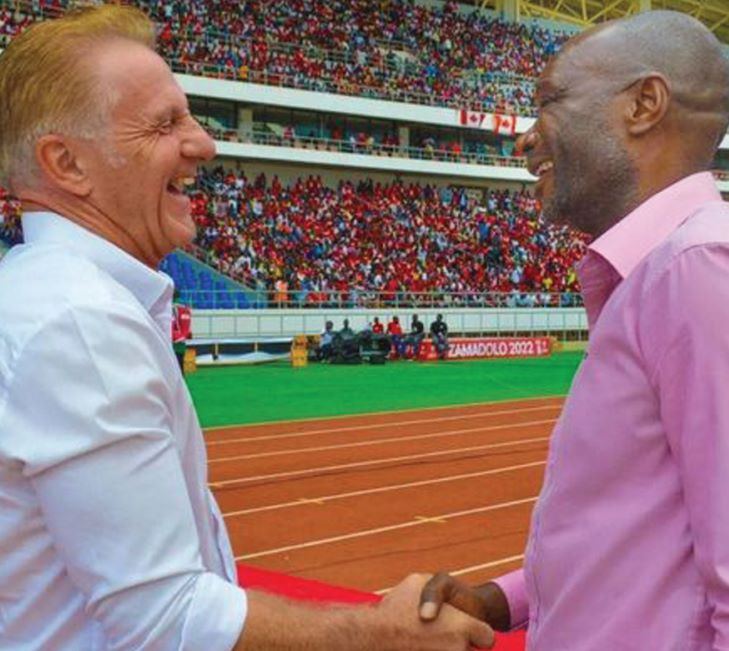Local football giants Nyasa Big Bullets, Silver Strikers and Mighty Mukuru Wanderers have said expatriate coaches are not given preferential treatment, but it all boils down to bargaining power.
The three teams were reacting to claims by National Football Coaches Association that local coaches are offered raw deals in contrast to expatriates who get hefty packages.
On duty in foreign land: Harrison (L) and Pasuwa greet each other before the Airtel Top 8 final
The association’s general secretary Dave Mpima was quoted by Zodiak Broadcasting Station yesterday as saying while expatriates have the luxury of getting a hefty package, including a vehicle and a modest house, local coaches do not get anything close to that.
He was quoted as having said: “We do not have a problem with the clubs hiring foreign or expatriate coaches because our profession has no boundaries, but the problem comes in terms of offers.
“Even when they have the same qualifications, you will find that expatriates get far much better packages than locals.”
In an interview yesterday, Mpima said all the local coaches that were in charge of the three clubs were getting far less than their foreign counterparts.
“So where is the motivation there?” he wondered.
But Bullets, whose head coach is Zimbabwean Kallisto Pasuwa, faulted local coaches for not having intermediaries to negotiate better deals.
Said the club’s chief administration officer Albert Chigoga: “It has to be put categorically clear that unwillingness to use intermediaries by the local coaches is the main cause of this frustration.
“Foreign coaches are well represented on issues of contract. They negotiate effectively, thereby receiving favourable contractual terms.
“While we have good coaches locally, their undoing is failure to bargain for better terms in their contract. They show desperation to get a job.”
Silver acting chief executive officer Faith Mzungu-Vilakati, whose side recently took on board Dutch coach Pieter de Jongh after parting ways with Zambian Daniel Kabwe last year, said they try to treat all members of staff equally.
She said: “We emphasise unity and that translates to no staff member being more important than another.
“As with any organisation, individual contracts are offered and employees are given room to negotiate and we try to reach to a reasonable agreement with everyone considering also what the company can afford and what the individual candidate is bringing to the table.”
On his part, Wanderers board and company secretary Chancy Gondwe said as a club, they provide equal opportunity for employees and do not discriminate.
He said: “We negotiate based on qualification, exposurer and experience. However, as Wanderers we can comfortably say that we are one of the best teams with good packages for employees from the technical panel to players.”
The Nomads are coached by Briton Mark Harrison.
Football analyst Charles Nyirenda also said packages are about negotiations.
He said: “In fact, if our caches were to concentrate in excelling in what they do, they wouldn’t even get worried about expatriates because they would be hired themselves.
“However, that isn’t happening because big clubs feel dissatisfied with the quality of their work. That is what has to be dealt with. We have had in the past satisfactory work from local coaches such as Kinnah Phiri, Yasin Osman, Young Chimodzi etc, who did well and were reasonably rewarded by their employers.
“Let the local coaches who are grieving perform and push for better packages as a just reward for the good work they do. It’s a give-and-take sort of thing.”
The post Clubs defend expatriates first appeared on The Nation Online.
The post Clubs defend expatriates appeared first on The Nation Online.
 Moni Malawi
Moni Malawi 

